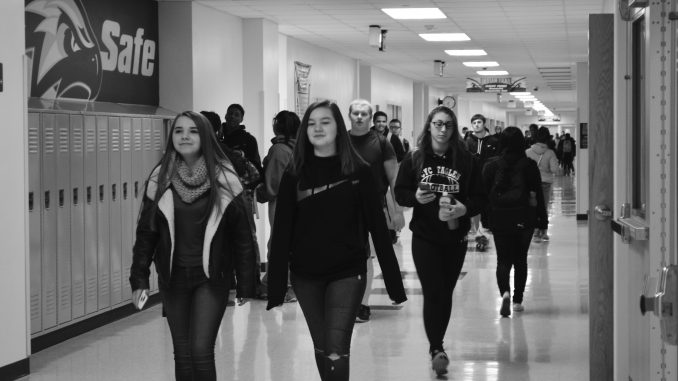
By Meagan Ginnaty-Moore, Staff Writer
 Students fill up the commons every morning as they wait for the bell to ring and allow them to enter the building. Every student has 10 minutes to get to their first period class on time, but this year getting to first period seems to be a big problem. Administration implemented 7:30 a.m. sweeps, much to the dismay of the student body. How did administration get to this point of 7:30 a.m. sweeps? Why are these sweeps necessary? Is this really the best way to improve attendance?
Students fill up the commons every morning as they wait for the bell to ring and allow them to enter the building. Every student has 10 minutes to get to their first period class on time, but this year getting to first period seems to be a big problem. Administration implemented 7:30 a.m. sweeps, much to the dismay of the student body. How did administration get to this point of 7:30 a.m. sweeps? Why are these sweeps necessary? Is this really the best way to improve attendance?
After talking to some members of administration, it’s clear that this program is a work in progress.
“What we’ve noticed is that [first period] is where we’re seeing a lot of the tardies and truancies, I’ve even gone into classes and teachers can’t start on time because they are waiting for students,” said Anthony Casper, Indian Trail assistant principal.
Heid Newberry, Indian Trail dean of attendance, says she doesn’t completely understand why this year has seen problems in getting to first period on time. The parking lot, while congested, is no more congested than previous years, she said.
“We don’t have more freshmen, but students can get to school earlier at 6:30 a.m.,” said Newberry.
According to school officials, there are about 440 students permitted for parking passes, though not everyone registers. Newberry doesn’t believe student drivers are the reason for the problem of tardiness.
“We don’t have more kids – we’ve always had 2,300 kids. I think it may just be how this school was laid out,” said Newberry.
Casper wanted to know how long it takes for student to get into the parking lot from various locations in the area surrounding Indian Trail, so he conducted a test. While it was not reflective of every students commute, many students do live near the areas used for Casper’s test.
“[I’ve driven] from a feed shop on 60th, Culver’s, and PDQ. If I left at 7 a.m., I can get in and through [the parking lot] within 10 minutes,” said Casper. “If I left at 7:15 a.m., then it took about 15 minutes to get through from those locations.”
Both Casper and Newberry say students should leave earlier than they think they should, and that the school opens at 6:30 a.m.
“[Students] can wait in the Commons and talk with friends. There is tutoring in the mornings, as well as weight lifting,” said Newberry.
This could ease the morning congestion in the parking lot, but what factors go into whether or not a sweep is conducted? Some things are out of students’ hands, like weather, accidents, or late busses. What happens then? Newberry says administration considers many things when it comes to considering students’ tardies.
“Weather permitting [we will conduct sweeps], heavy traffic or an accident occurring will be a non-sweep morning… last week there were no late busses but there were many kids who were past on the bus routes and they were not considered late,” said Newberry. “ “Those things are out of our hands.”
Casper says this whole program is to make sure students are getting as much class time as possible. With more and more students getting to class late, teachers have trouble starting on time when they have to stop to let students into the room.
However, on Dec. 9, a 7:30 sweep was conducted and some students, who were
walking to their class and were only going to be a few seconds late, ended up being
15 minutes late. These students had to walk from their class all the way back to the commons and wait for a pass. This can be a far distance and take up valuable class time.
Could there be a more efficient way to execute the sweeps, like various stations around the school or personnel standing in the hall distributing passes?
“We are learning as we go – what’s going to be the most effective thing… We have talked about having security guards issuing detentions,” said Casper. “So, we understand this is not going to be a perfect method but we need to do something because right now so many people are late.”
This program is very much in its early stages of development, and administration plans on adding computer for students to sign in and pick detention times. This may speed up the process.
Not serving these detentions can lead to be ineligible to attend dances and/or land in In-School Suspension (ISS). However, these are not the only incentives for students to get to class on time.
“We have incentives coming up in the months of February, March, and April,” said Newberry. “Perfect attendance for Bucks tickets and things like that will improve attendance.”
These sweeps may not be popular among students, but administration feels they are necessary to improve attendance. These sweeps will continue and it appears it’s in students’ best interest to try as hard as they can to get to class on time.
